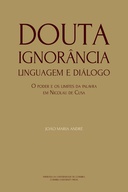Explore

Douta Ignorância. Linguagem e Diálogo
João Maria André
2019
0 Ungluers have
Faved this Work
Login to Fave
In this book we have chosen three thematic threads to go through the philosophical-theological thinking of Nicholas of Cusa and cross it with some motives of philosophical interrogation in this second decade of the twenty-first century: learned ignorance, language and dialogue. In learned ignorance lies a way of being in knowledge that deconstructs all certainties, but does not plunge us into skepticism. By language we say and say our appropriation of reality, a language that the thinker of the fifteenth century has always recognized as dynamic but also recognized in its fragility to adequately tell the truth and the world. If our way of inhabiting knowledge is learned ignorance and if the device we use to say it is language, then dialogue emerges as a space of thought, discourse and action: thought in dialogue, discourse in dialogue, action in dialogue become modes of realization of the project of a dialogical anthropology still today deeply present.
This book is included in DOAB.
Why read this book? Have your say.
You must be logged in to comment.
Rights Information
Are you the author or publisher of this work? If so, you can claim it as yours by registering as an Unglue.it rights holder.Downloads
This work has been downloaded 94 times via unglue.it ebook links.
- 94 - pdf (CC BY-NC-ND) at Unglue.it.
Keywords
- dialogue
- Learned ignorance
- Nicholas of Cusa
- philosophy of language
- Portuguese
- tolerance
Links
DOI: 10.14195/978-989-26-1752-7Editions

